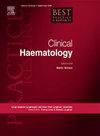Adoptive cellular therapies in multiple myeloma
IF 2
4区 医学
Q3 HEMATOLOGY
引用次数: 0
Abstract
Plasma cell myeloma (multiple myeloma) is a blood cancer characterized by the clonal proliferation of plasma cells in the bone marrow. Treatment strategies evolve year by year, new drugs getting Food and Drug Administration (FDA)-approved each year. Chimeric antigen receptor (CAR) therapies are an advanced form of immunotherapy that engineer T cells to recognize and destroy cancer cells. In recent years, adoptive cellular therapies have been successfully used to treat relapsed or refractory patients. Now, growing evidence supports their effectiveness when used earlier in treatment, even as an alternative to autologous hematopoietic stem cell transplantation. Ongoing research is expanding CAR therapy to solid tumors and enhancing safety and efficacy through innovative designs and combination strategies. In this paper, we aim to highlight the brief history and the latest advancements in CAR T-cell and NK-cell therapies for plasma cell myeloma.
多发性骨髓瘤的过继细胞治疗
浆细胞骨髓瘤(多发性骨髓瘤)是一种以骨髓浆细胞克隆性增殖为特征的血癌。治疗策略每年都在发展,每年都有新药获得美国食品和药物管理局(FDA)的批准。嵌合抗原受体(CAR)疗法是一种先进的免疫疗法,通过改造T细胞来识别和摧毁癌细胞。近年来,过继细胞疗法已成功用于治疗复发或难治性患者。现在,越来越多的证据支持它们在早期治疗时的有效性,甚至作为自体造血干细胞移植的替代方法。正在进行的研究正在将CAR疗法扩展到实体肿瘤,并通过创新的设计和联合策略提高安全性和有效性。在本文中,我们旨在重点介绍CAR - t细胞和nk细胞治疗浆细胞骨髓瘤的简史和最新进展。
本文章由计算机程序翻译,如有差异,请以英文原文为准。
求助全文
约1分钟内获得全文
求助全文
来源期刊
CiteScore
4.20
自引率
0.00%
发文量
42
审稿时长
35 days
期刊介绍:
Best Practice & Research Clinical Haematology publishes review articles integrating the results from the latest original research articles into practical, evidence-based review articles. These articles seek to address the key clinical issues of diagnosis, treatment and patient management. Each issue follows a problem-orientated approach which focuses on the key questions to be addressed, clearly defining what is known and not known, covering the spectrum of clinical and laboratory haematological practice and research. Although most reviews are invited, the Editor welcomes suggestions from potential authors.

 求助内容:
求助内容: 应助结果提醒方式:
应助结果提醒方式:


